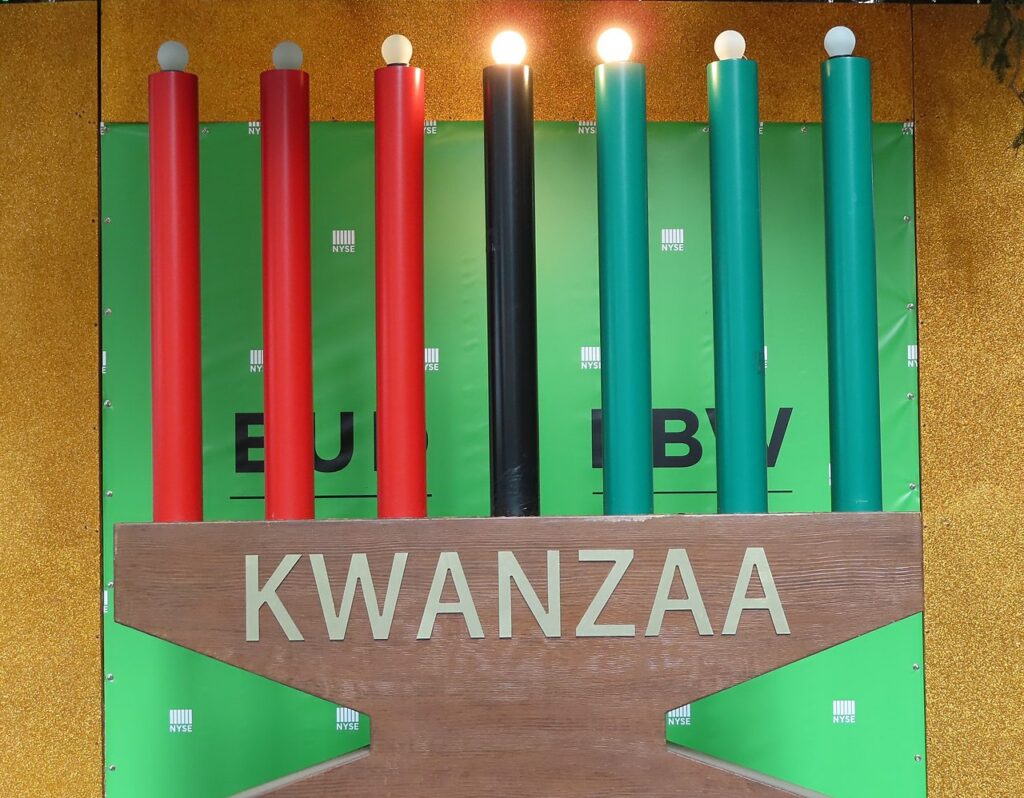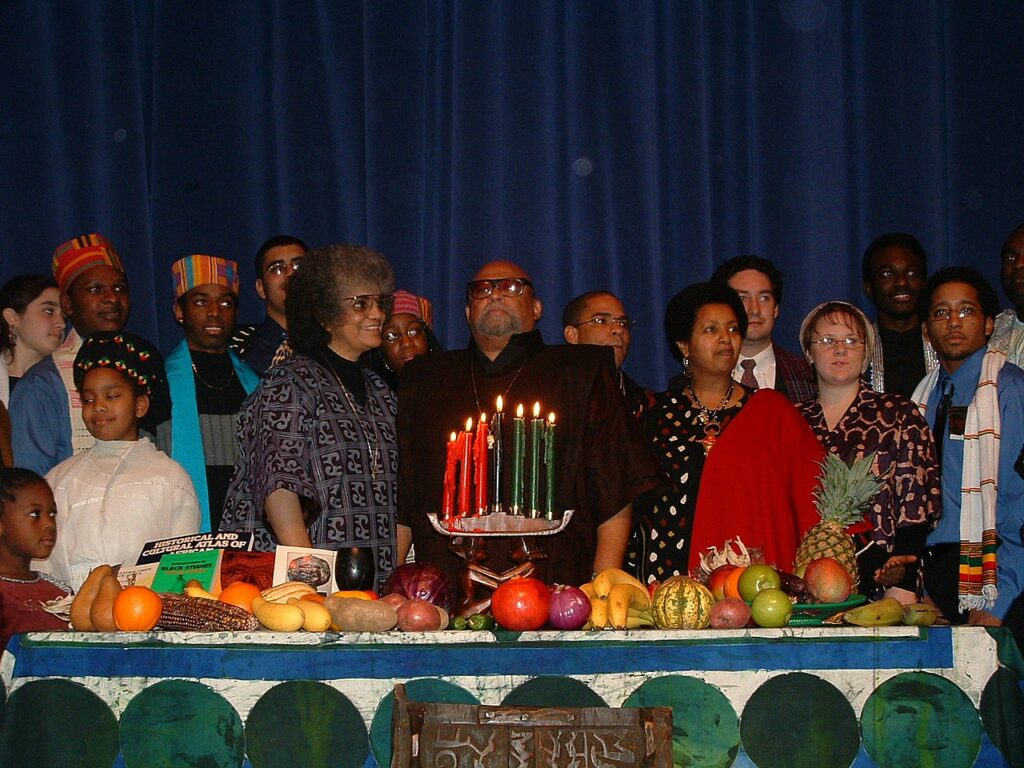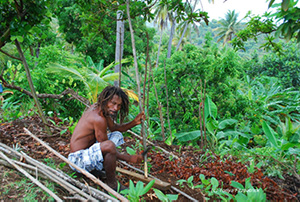Embracing the Rich Tradition of Kwanzaa

happy kwanzaa Texas
Posted December 26, 2023
My father LOVED Christmas. One of our favorite traditions was driving around the neighborhood to see Christmas lights and decorations. He also loved dressing up as Santa. My dad was also very Afro-centric so I also knew about Kwanzaa but, as a young child, I didn’t really understand the holiday. I remember fondly that dad would transition from holiday sweaters to dashikis for a few days during the cold winter weeks.
As an adult and a student of history, I’ve embarked on a greater understanding of the Kwanzaa holiday and what I’ve discovered is very interesting. I’ve learned that Kwanzaa, a celebration deeply rooted in African heritage, offers a unique opportunity for individuals across the globe to come together in unity, reflection, and festivity. In this article, I will delve into the rich history of Kwanzaa, explore its profound meaning, examine where it is celebrated, assess its acceptance on a global scale, and understand why it is observed the week following Christmas.

History of Kwanzaa
Kwanzaa, a Swahili term meaning “first fruits,” was created in 1966 by Dr. Maulana Karenga, a professor and scholar of African studies. Its origins can be traced back to the turbulent 1960s, a period marked by the Civil Rights Movement and a quest for identity and cultural pride among African Americans. Dr. Karenga designed Kwanzaa as a way to connect individuals with their African roots and foster a sense of community.
The celebration draws inspiration from traditional African harvest festivals, emphasizing seven core principles, known as the Nguzo Saba, each celebrated on a different day of Kwanzaa. These principles include Umoja (unity), Kujichagulia (self-determination), Ujima (collective work and responsibility), Ujamaa (cooperative economics), Nia (purpose), Kuumba (creativity), and Imani (faith). Families and communities gather to light the Kinara, a seven-branched candleholder representing these principles, and discuss their meanings.

Meaning of Kwanzaa
At its core, Kwanzaa is a celebration of family, community, and culture. It serves as a reminder of the importance of unity, self-determination, and collective responsibility. The principles of Kwanzaa encourage individuals to reflect on their values, set goals for personal and community development, and actively contribute to the well-being of their communities.
Kwanzaa celebrations typically involve a communal feast known as Karamu, where families come together to share food, stories, and laughter. Traditional African symbols, such as colorful cloth and artwork, are often incorporated into decorations, fostering a vibrant and culturally rich atmosphere.
Where is Kwanzaa Celebrated
Originally established in the United States, Kwanzaa has gradually gained recognition and acceptance in various parts of the world. While it remains most widely celebrated in the African American community, people from diverse backgrounds are embracing the principles and festivities of Kwanzaa. Community centers, schools, and cultural organizations often host Kwanzaa events, welcoming individuals of all ages and backgrounds to participate.
In addition to the United States, Kwanzaa has found a global audience in countries with a significant African diaspora, such as Canada, the United Kingdom, and parts of the Caribbean. Efforts to spread awareness about Kwanzaa’s cultural significance have contributed to its acceptance in multicultural societies, making it a symbol of unity and shared values.
The global acceptance of Kwanzaa is evident in the growing number of events and celebrations hosted in different parts of the world. Social media platforms, educational programs, and cultural initiatives have played a crucial role in raising awareness about Kwanzaa, making it more accessible to a broader audience.
Celebrating Kwanzaa During the Holiday Season
The decision to celebrate Kwanzaa from December 26th to January 1st holds cultural and practical significance, contributing to the distinctiveness and resonance of the observance.

Placing Kwanzaa in the immediate aftermath of Christmas allows individuals of African descent to maintain a distinctive cultural identity within the broader context of the holiday season. As Christmas is a widely celebrated cultural and religious holiday, Kwanzaa’s timing ensures that African Americans and others observing the festival can seamlessly integrate their unique traditions into the larger tapestry of festive occasions.
Additionally, the dates of Kwanzaa align with the time when many African societies traditionally celebrate harvest festivals. By adopting this timing, Kwanzaa draws inspiration from these agricultural celebrations, emphasizing the importance of community, gratitude for the harvest, and the unity of people in the face of challenges. This synchronicity with historical African traditions enhances the cultural authenticity of Kwanzaa.
The end-of-year timing of Kwanzaa provides an opportunity for reflection on the events of the past year. The seven days of Kwanzaa correspond to the Nguzo Saba, or the seven principles, encouraging individuals and communities to reflect on their adherence to these principles over the year.

Celebrating Community and Diversity
Kwanzaa stands as a testament to the power of cultural celebration and unity. Its history, rooted in the quest for identity and empowerment, continues to inspire individuals worldwide. As we embrace the principles of Umoja, Kujichagulia, Ujima, Ujamaa, Nia, Kuumba, and Imani, we contribute to a global tapestry woven with the threads of diversity, understanding, and shared humanity. Kwanzaa’s journey from its inception to its present acceptance is a celebration of culture, heritage, and the enduring spirit of community, made even more impactful by its celebration within the holiday season.
Book Accommodations Anywhere in the World
Search, compare and book discount hotels and accommodations at the best price for anywhere in the world using the interactive map.
Join the community!

Join our community to receive special updates (we keep your private info locked.)




